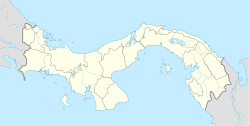Río Indio, Colón facts for kids
Quick facts for kids
Río Indio
|
|
|---|---|
|
Corregimiento
|
|
| Country | |
| Province | Colón |
| District | Donoso |
| Area | |
| • Land | 36.4 km2 (14.1 sq mi) |
| Population | |
| • Total | 1,044 |
| • Density | 28.7/km2 (74/sq mi) |
| Population density calculated based on land area. | |
| Time zone | UTC−5 (EST) |
Río Indio is a small area in Panama. It is known as a corregimiento. Think of it like a local district or a small town area within a larger region. Río Indio is located in the Donoso District, which is part of the Colón Province in Panama.
In 2010, about 1,044 people lived in Río Indio. Its population has changed a bit over the years. In 1990, there were 963 people, and by 2000, the population grew slightly to 974.
Contents
Understanding Corregimientos
What is a Corregimiento?
A corregimiento is a special type of administrative area in Panama. It is like a local division that helps manage different parts of a district. Each district in Panama is made up of several corregimientos.
How Corregimientos Work
These areas help organize local government and services. They make it easier to manage things like schools, roads, and community projects. People living in a corregimiento often feel a strong connection to their local area.
Geography and Location
Where is Río Indio?
Río Indio is located in the Colón Province of Panama. This province is on the Caribbean coast of the country. The Donoso District, where Río Indio is found, is known for its natural beauty.
Area and Size
The land area of Río Indio is about 36.4 square kilometers. This makes it a relatively small area. The population density is around 28.7 people per square kilometer. This means it is not a very crowded place.
Population Changes Over Time
Tracking the Numbers
The population of Río Indio has stayed fairly stable. In 1990, there were 963 residents. By 2000, the number increased slightly to 974 people. The most recent count in 2010 showed a population of 1,044.
What Population Numbers Tell Us
These numbers help us understand how communities grow or change. A stable population often means that people are happy living there. It also shows that the area is not experiencing rapid growth or decline.
See also
 In Spanish: Río Indio (Colón) para niños
In Spanish: Río Indio (Colón) para niños
- Corregimientos of Panama
- Colón Province
- Donoso District


